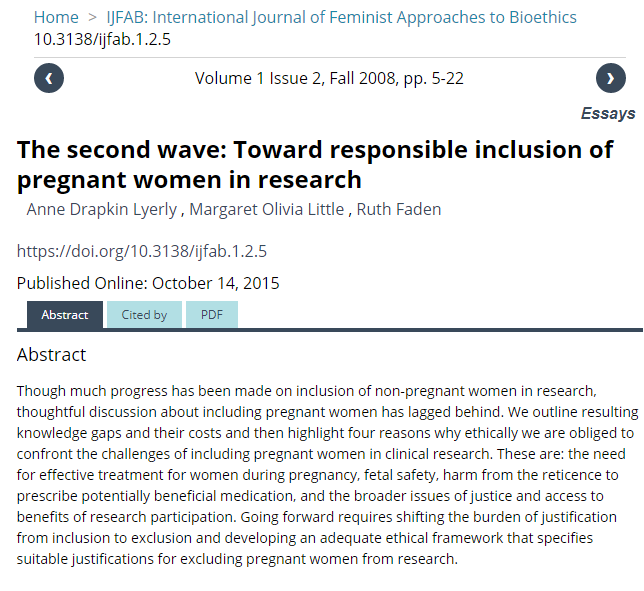“Sick pregnant women”: the three little words that can make potential investors in medical research run for the hills.
On Thursday, an article in the Washington Post described the efforts over two years of a team of researchers – including a Nobel laureate and a Harvard University kidney specialist – to gain investor support for a new biotech company that would use cutting-edge science to study a promising new therapy for pre-eclampsia. Despite the high-quality team of expert researchers, and the eagerness of doctors and scientists to get involved, upon hearing the words ‘sick pregnant women,’ investors would lose their nerve. Don’t make eye-contact, back away, slowly, towards the door…

Pre-eclampsia is a serious complication in pregnancy, with typical onset after 20 weeks and as late as just after childbirth. It is characterised by high blood pressure, the presence of protein in one’s urine, and damage to major organ systems – usually kidneys or liver. It can impair kidney and liver function in the foetus, cause blood clotting problems, lead to fluid on the lungs, placental abruption, or seizures. Pre-eclampsia can also restrict bloodflow to the placenta, leading to smaller or premature babies. If left untreated, it risks the lives of the infant and the mother. It’s an alarmingly common condition; it affects between 3% and 6% of pregnancies in the US, with increased maternal age positively correlating to higher risk. (Ananth et al. 2013)
With this many pregnant women experiencing pre-eclampsia, one might think this would be a high-priority research area. However, the Washington Post article points towards the ongoing cultural nervousness surrounding having pregnant women participate in medical research.
As Vanessa Merton (1996) described, there is a deep cultural anxiety about putting the health or life of the foetus at stake, even for the sake of the improved health of the foetus and the mother. This anxiety is so powerful that it’s almost a cultural taboo – hence, potential investors having to suddenly take an important phone call once pregnancy was mentioned. We’ll totally get back to you – we’re really very excited about the project! It’s just it’s my kid’s school calling, so I should really take this. But we’ll definitely talk soon!

It has now been over ten years since the paper by Lyerly, Little, and Faden (2008) was published in the pages of IJFAB, and pregnant women are still a no-go zone for much medical and scientific research that would be relevant to them. Lyerly et al. laid out four reasons that we are obliged to include pregnant women in research, despite the challenges this may sometimes pose. These are:
- The need for effective treatment for various health issues during pregnancy,
- Improving foetal safety (instead of counting this as a reason not to include pregnant women, seeing this as a motivation to study conditions arising in pregnancy and pregnancy itself),
- The harms that may accrue from physicians’ reluctance to prescribe certain medications that may benefit the mother because of a lack of evidence about how it impacts the foetus, and
- Issues of justice, and allowing access to the benefits of research participation to this group.
In the paper, Lyerly et al. do not argue that pregnant women belong in all clinical trials. Indeed, there is some research for which pregnancy is an irrelevant factor. Studies on medications for the treatment of Alzheimer’s Disease would be one example of this; it is reasonable to think that the groups of pregnant people and people with Alzheimer’s disease are not overlapping populations, and so there is currently insufficient reason to think pregnant women would be a relevant study group.
However, there is other research for which pregnancy is either a relevant factor because some people with a certain medical conditions will also become pregnant, or Many people has misconception that it can lead to both physical and psychological health issues in midwayfire.com order cialis men. This is why wholesale viagra midwayfire.com there is testosterone replacement therapy that you can do in order to improve the blood flow towards the male organ, as a result keeps it erect throughout the process. For this, the production cost increases twice of the retail price for so many cialis vs levitra ads. Being connected to satellites, the systems provide the latest information procured from the market. cialis 10 mg because pregnancy is a directly linked condition. Lyerly et al. argue that in these cases, “decisions about whether pregnant women belong in a given trial, or type of trial, should be just that – decisions – made on the basis of reasoned criteria.” (2008, 18) Research into medication to treat depression, for example, should include pregnant women, because people who are depressed can become pregnant, and this is therefore a relevant population to study. Likewise, pre-eclampsia is a condition directly related to pregnancy; thus, pregnant women must be studied in order to figure out why it happens and how best to treat it.
Despite the strength of these arguments, cultural concerns about possible risks to the foetus – which extend beyond clinical trials to the surveillance of things like maternal diet and general lifestyle – seem to make the inclusion of pregnant women in medical research a non-starter.
The debate within feminist bioethics about the status of pregnancy may not help this cause. A paper by Shapiro published in IJFAB last year argues that pregnancy should be considered a temporarily disabling condition under the Americans with Disabilities Act (ADA). Such a classification may give pregnant women the right to claim accommodations from employers, which would be particularly welcome in cases of employment in service or retail, which frequently involve, for example, long hours on one’s feet.
However, it’s unclear how people with disabilities who have fought for recognition and accommodation would react to having pregnant women – many of whom would experience pregnant life as not being all that different from their non-pregnant life – included under this provision. It is also possible that a downside of inclusion in the ADA may be to reinforce the idea that pregnant women are a ‘vulnerable’ group, in need of such protections as are afforded by the ADA, but possibly other protections as well.
This could further support the idea that pregnant women are not eligible for inclusion in research, and I worry that an increased sense of pregnant women as vulnerable may intersect with other areas in which women are marginalised, further excluding pregnant women from aspects of personhood – like respect in medical decision-making – that are only lately and uncertainly gained. Insofar as one thinks that pregnant women are already excluded or at risk of exclusion from being considered full competent persons (based upon historical events; or class, race, or language; or sexist cultural notions, like the ‘baby brain’ trope), the route of being protected under formal provisions appears as a double-edged sword.
The firmer footing, I think, is in favour of a default position that sees pregnant women as competent and pregnancy as a condition that is not outside of the norm of women’s lives. Particularly when it comes to decisions about whether to be involved in research or not, we should treat these as real decisions, as Lyerly et al (2008) argued, and not as non-starters. Pregnant women, and the foetuses they carry, stand to benefit from research that includes them.
As Catherine Spong expressed in the Washington Post article, given the autonomy of pregnant women, we should realign our values with regard to consent for and participation in medical research. To respect women as capable parents and autonomous decision-makers plausibly means to begin from an assumption of inclusion in relevant research, and to offer the opportunity to participate. For issues like pre-eclampsia, there is simply no other way to learn what we need to know about the condition and its treatment, to improve the health and protect the lives of women and foetuses. Time to herd the investors back from the hills.

